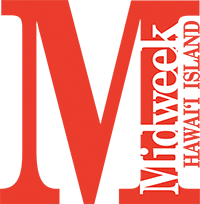The Power Of ‘Peaman’
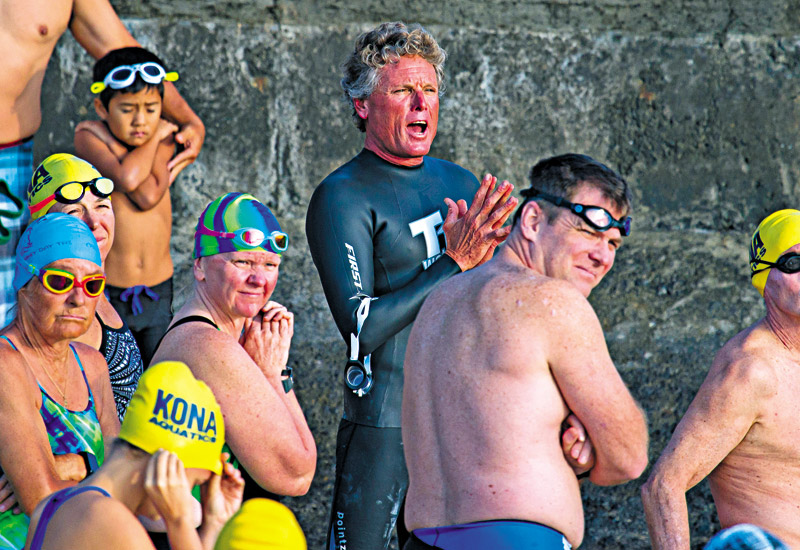
Sean “Peaman” Pagett cheers on athletes during one of his biathlon events in Kailua-Kona. RICK WINTERS PHOTO
Few people love life more than ultra-positive Ironman Sean “Peaman” Pagett, who cheated death once before. Little wonder why his monthly swim-and-run biathlons are so popular with the masses in Kailua-Kona.
For biathlon creator and Ironman competitor Sean “Peaman” Pagett, daily gratitude is no mere platitude. That’s because, at 53, he’s emerged triumphantly from a host of challenges that would have discouraged or totally stopped most people long ago. But this is “Peaman” we are talking about. In his mind, there is no conundrum too big to beat, no obstacle too daunting to face head on, no race that cannot be won.
Seventeen broken bones? Been there and back. MRSA infection in the heart lining? Beating it and moving on. Compromised endocrine system wreaking havoc with the body’s function? Handling it. Near death after dropping to a shriveled 80 pounds? Fully recovered and now double the weight. There’s more, but you get the idea.
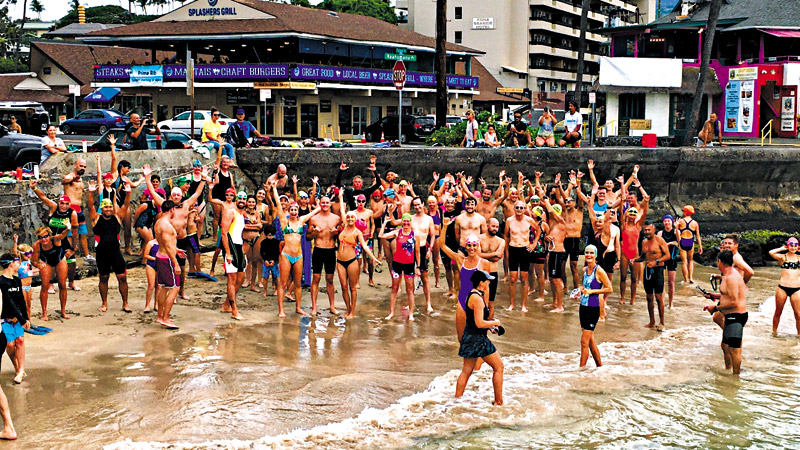
PHOTO COURTESY SEAN “PEAMAN” PAGETT
His remarkable story offers genuine testimony to the enduring strength and resilience of the human body combined with willful, mind-over-matter healing and the power of positive thinking. And a lot of faith thrown in.
What’s the key?
“Living every day to the fullest and actively creating positivity whenever and wherever possible,” says Pagett, who was affectionately given his nickname decades ago in honor of his beloved swim-and-run biathlons known as the Peaman events. To date, 392 of these always-free events have taken place by the Kailua pier in Kailua-Kona.
Founded in 1987, the Peaman events provide an alternative to traditional triathlons or biathlons, which are costly to produce due to insurance, permitting and other factors. Pagett wanted to create distances that anyone could do and that were inclusionary, not exclusionary (full of rules about what a participant can and cannot do). The courses are designed to include the whole family. For example, the upcoming Doc Farren Hall of Fame Biathlon on Dec. 30 features a half-mile swim and 3.9-mile run, including the LavaKids PeaWee 200-yard swim and 1-mile run.
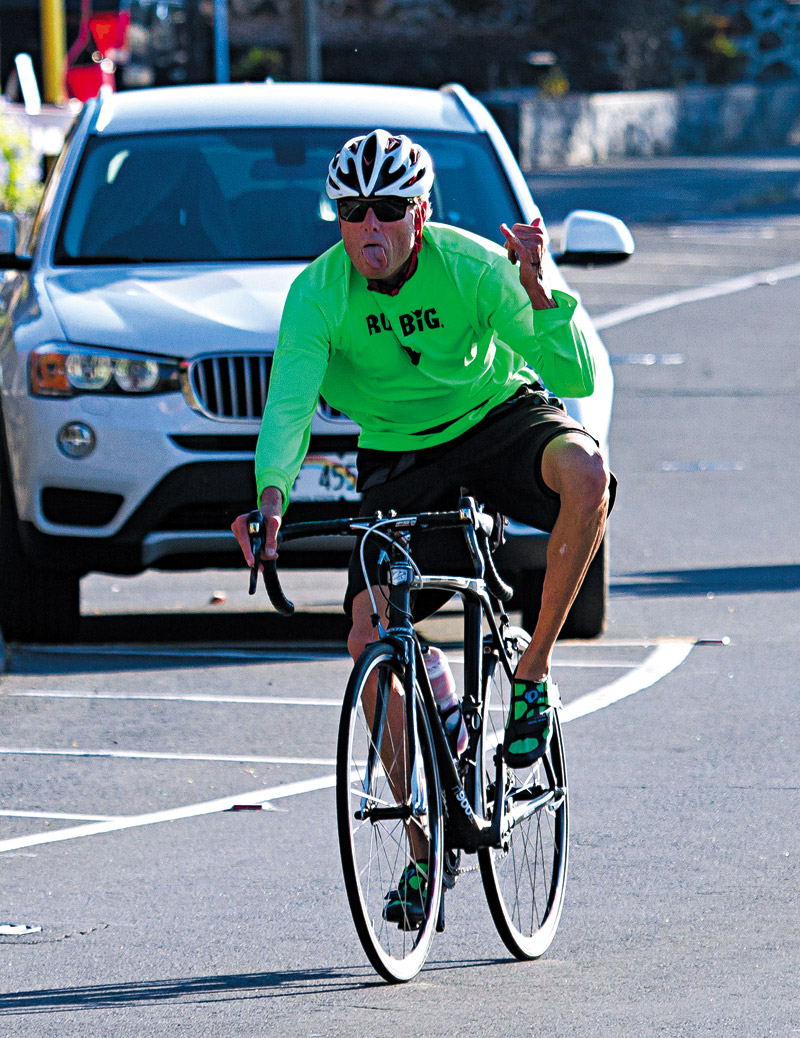
A never-say-die attitude and an exposed tongue are two character traits always on display for triathlete Sean “Peaman” Pagett whenever he’s in the thick of a competition. RICK WINTERS PHOTOS
“No entry forms or fees; no sign-ups, only sign outs when finished; masks, fins and snorkels welcome; LavaKids PeaWee course always available; Fun for the Whole Family,” reads the Peaman poster description, the same for all 13 events Pagett organizes each year.
“We have a different vibe than traditional competitive events. We strive to promote a family atmosphere,” adds Pagett. “Some participants come for the exercise, some for the social interaction, some to bring the kids, and some to play with their dogs. Last week, we had five dogs in the race. Everything you want to do is OK. It’s all about moving and playing. And if we don’t have a category for you, you can create your own.”
Participants may combine the distances, too. For example, if they want to do the PeaWee swim distance (200 yards) and the adult long course, they are welcome to mix and match to create the experience that suits them.
To increase motivation for the kids, Pagett awards finisher prizes.
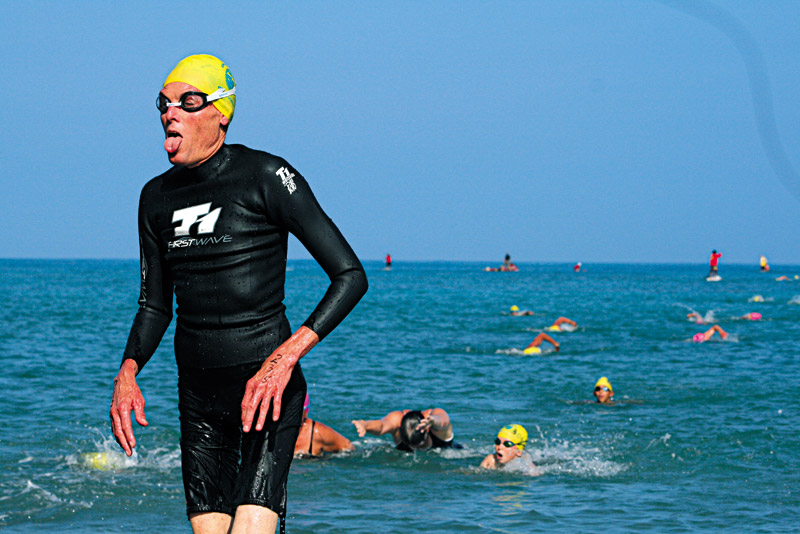
“We give out really good quality toys such as Super Soakers, board games and even BMX bikes. They really get the kids fired up. So rather than something the parents drag the kids to, the events become something the kids drag their parents to,” he says with a laugh.
Inspiring others and giving to the community have become not just a lifestyle, but a passion and commitment. Born in Manhattan Beach, California, Pagett moved to Kona with his family in 1969 to escape the “rat race.” His dad worked as a carpenter and his mom as a boutique owner and seamstress who was known for her tie-dyed and macrame creations. Pagett remembers Kailua town then as a sleepy fishing village.
But life changed suddenly and profoundly when Pagett was just 9. As he and his mom were crossing a street in California, a drunk driver ran into both of them, killing his mom instantly. In that moment, Pagett experienced what has come to be known as a near-death experience.
“We were like rag dolls, getting thrown around and bones were snapping and breaking,” he recounts. “Yet there was no core fear, anger, sadness or any other negative emotion. I was in the dark tunnel traveling toward a bright light, and could only sense pure love, like the collective love of everyone alive and everyone who has ever lived. But a message came from somewhere that it was not my time (“not even close,” it said) and when I turned around to go back, I could see my body mangled on the street and laid out at right angles. But I returned to my body, having had this beautiful experience, and I knew it would be OK.”
He also remembers an acute hypervigilance, allowing him to hear the electricity coursing through the power lines and the sand crunching under their shoes as the paramedics walked around the accident scene.
“I was a young child, so I had no preconceived notions of what a near-death experience was. But because it was all positive, I am blessed today to be able to share this story of hope,” he says.
Although Pagett would face constant lifetime health issues as a result of the accident, including a smashed pituitary gland, and “messed up” endocrine system and ensuing osteoporosis from the lack of hormones, he says he would not change a thing about his life nor the cards he’s been dealt. Despite the pain, the ups and downs and the physical obstacles, he’s still been able to push himself athletically, mentally and spiritually.
As a four-time Ironman Kona finisher, he once talked himself up from his deathbed to save his own life.
“I was lying there near death, weighing 80 pounds (in June 2013) with MRSA in my heart, unable to keep food down. I told myself I’m just going to do it — the Hāpuna Swim. If you can swim a mile when you are dying, you can do anything. After that, I have just kept myself moving forward and active. You can heal yourself; you can reverse certain death.”
As testament, in 2017, he finished the Ironman 70.3, (“1/2 Honu”), which is half the distance of a full Iron-man, and continues to compete in Kona events through the year.
“I like to think that every day is a brand new day, a brand new life,” he says. “There is no time to waste on negativity. When you can walk around after beating death, you are so grateful, and the gratitude snowballs and builds on itself. So I make a goal to hold on to that attitude and do good things — mentally, spiritually and physically to strengthen, recover and get well.”
As a partner and personal trainer at the Fitness Forever gym in Kōpiko Plaza, which is planning expansions in Pahoa and Waikoloa, and chief organizer of the Kona Peaman events, Pagett sees a bright future.
Indeed, he has something special planned for his upcoming 54th birthday: The Peaman Birthday Triathlon, with one participant — himself. He plans to swim from Mauna Kea Beach to Hāpuna Beach, bike from Kawaihae Road to Old Saddle, then from Old Saddle to New Saddle; then run to Mauna Kea Visitors’ Center at 9,200 feet before heading back down.
Indeed, no obstacle appears too great for “Peaman.”
